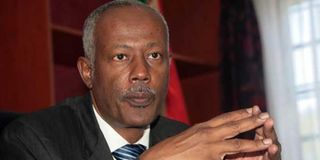More Kenyans to benefit from Sudanese scholarships

Sudanese Ambassador to Kenya Elsadig Abdalla Elias. He has said 30 Kenyans will benefit from scholarships to study oil-related courses in his country. PHOTO | EVANS HABIL | NATION MEDIA GROUP
What you need to know:
- The additional 150 scholarships will benefit 30 Kenyans who will be trained on oil-related studies.
- Khartoum said it had raised scholarships from 200 annually in 2012 to 400 in 2015 and now 550.
- Most of the Kenyans are studying at the International University of Africa.
The Sudanese government is increasing annual scholarships given to Kenyans in what could be a new initiative to improve Khartoum’s relations with Nairobi.
On Sunday, Sudanese Ambassador to Kenya Elsadig Abdalla Elias told reporters the additional 150 scholarships will benefit 30 Kenyans, who will be trained on oil-related studies.
In total, 550 Kenyans have been admitted to sponsored programmes at Sudanese universities but the envoy said the number could rise depending on the applications they receive.
“We believe the best thing to give to a developing nation is education. It is the best tool for developing oneself, family and the country,” the Envoy told reporters while unveiling a programme for the Sudan cultural exhibition in Nairobi.
“We are receiving and reviewing applications and whoever qualifies, we will accommodate them,” he added.
TECHNOLOGY
Khartoum said it had raised scholarships from 200 annually in 2012 to 400 in 2015 and now 550 because more training opportunities have opened up in medicine, pharmacy, agriculture and other technology areas.
Most of the Kenyans are studying at the International University of Africa, Sudan’s institution with the largest African student population, now at 19,000.
The exhibition event to start from April 4 to 7, he argued, is meant to open up Sudan to Kenyans in what he called a “people-people relations.”
A delegation of 40 Sudanese officials is expected in Nairobi where Sudanese art, trade, education and technology will be shown at the Kenyatta International Convention Centre (KICC) and later public lectures will be conducted in a selected universities.
The idea of using education and cultural connections is Sudan’s new way of reaching out to Kenya, years after Khartoum grew distant when South Sudan seceded in 2011.
PEACE PACT
Though the formative pact, the Comprehensive Peace Agreement (CPA), which enabled that secession was signed in Kenya, Sudan’s influence in East Africa and especially Kenya became lukewarm.
Its bid to enter the EAC was rejected as it didn’t share a border with any member.
In addition, President Omar al-Bashir was indicted by the International Criminal Court and the Court’s member states like Kenya were required to arrest him if he stepped on their soil.
Sudan was also until January 2017 on the US sanction list as a state sponsor of terrorism.
The envoy accused the international press for the bad image Sudan has received over the years and argued that many people do not know much about the country.
BAD REPORTING
“You may hear rumours of Sudan and terrorism; that is partly because of the bad media reporting. We have no links to groups like ISIL because our version of Islam is very moderate. Have you ever heard of any terrorist bomb attack in Sudan?” he posed.
“What is important now is the knowledge. If the people are aware of each country’s opportunities, then the business will move, the politics will move and the technical cooperation will move,” he added.
Despite the situation, Sudan remains Kenya’s second-largest buyer of its tea in Africa, and fifth globally.
In 2016, it imported 25 million kilos of tea from Kenya worth Sh5.1 billion, according to Trade Mark East Africa.
When President Uhuru Kenyatta toured Khartoum last November, Sudan agreed to lower inspection fees on Kenyan tea by 75 per cent from the usual $8,000 (Sh82,500).
Sudan, however, has no investor in Kenya, something the ambassador blamed on lack on information about the country to Sudanese business people.





